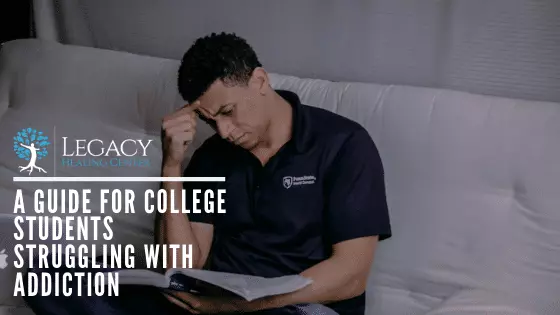
A Guide for College Students Struggling with Addiction
Legacy Healing Center Blog
College is an exciting time for young adults who are continuing their education and starting their careers, however, the copious pressure of balancing classes, studies, work, and a social life can place a great burden on students. With binge drinking and drug experimentation being so common among college students, many take their drinking and drug use far beyond experimenting. Some may use drugs or alcohol to cope with the stressors of college, potentially leading to the development of an addiction.
Although trends of drinking and substance abuse among college students vary year by year, it is evident that many college students are at risk for abusing substances and developing an addiction.
Substance Abuse Among College Students
College is surely a critical time for young adults, as many of them are living on their own for the very first time. There is new found freedom and social circles, making college students susceptible to engaging in partying, binge drinking, and drug use.
A study conducted by the National Institute on Alcohol Abuse and Alcoholism found that nearly 60% of college students between the ages of 18 and 22 report drinking alcohol each month, and approximately 2 out of 3 students in this group engaged in binge drinking. Binge drinking involves drinking more than 4 drinks for women and 5 drinks for men within a 2 hour period of time. Nearly 20% of college students who binge drink regularly meet the criteria for alcohol use disorder. Even though binge drinking has become popular on many college campuses, it poses serious physical and mental health risks such as injuries, traffic violations, accidents, and even fatalities.
In addition to alcohol, college students abuse prescription drugs and illicit substances at high rates as well. Marijuana is the most used drug among college students, however, ecstasy, LSD, cocaine, prescription drugs such as Oxycodone and Adderall, and heroin are also frequently abused by college students. Over 28% of college students have reported abusing some form of prescription medication in their lifetime and 13.7% reported misusing prescriptions in the past year. While many view it acceptable to take Adderall to focus on studying or take Oxycodone to feel euphoria at parties, this drug use can quickly become a life-threatening addiction. It is estimated that 7% of college students who abuse drugs meet the criteria for substance use disorder.
Addiction vs. Social Use
It is unrealistic to expect college students to completely abstain from drugs and alcohol, however, there is a fine line between addiction and social drinking or drug use.
If a person continues to abuse a substance over an extended period of time, their body will begin to develop tolerance. Tolerance is characterized by the body requiring higher amounts or a stronger potency in order to achieve the desired physical and mental effects from the substance. As tolerance continues to build, it is likely that physical dependence will too.
Dependency on a substance will cause a person to experience withdrawal symptoms when the substance is not taken. Many people will continue to use drugs or alcohol in order to avoid withdrawals, beginning a dangerous habitual pattern of substance abuse which can easily spiral into addiction.
Signs of Addiction
Some behavioral and physical signs that indicate a substance addiction include
- Isolating from friends and family
- Needing increasing amounts of a substance to produce the desired effects
- Engaging in risky behaviors, such as driving under the influence, lying to friends and family, stealing money or possessions, and selling one’s possessions
- Experiencing withdrawal symptoms when a substance isn’t taken
- Having obsessive thoughts about getting high or drinking
- Not attending classes
- Attending class under the influence of drugs or alcohol
- A significant drop in grades and GPA
- Loss of desire to engage in social activities
- Frequent absences from work
Treatment for College Students
If you or a loved one are suffering from addiction while enrolled in college, it is imperative to seek treatment sooner than later. Students who seek treatment and participate in aftercare to treat their addiction and any underlying mental illness are more likely to graduate than those who do not.
Drug rehab is not a one size fits all solution to addiction. There are different treatment modalities to effectively meet the needs of each individual.
Inpatient addiction treatment allows individuals to stay in a residential setting for a length of time with other people who are trying to stay sober. Clients will learn the importance of building a support group while engaging in different therapy’s, such as group therapy, individual therapy, dual diagnosis therapy, holistic therapy, and family therapy. Upon completion of inpatient rehab, individuals will step down into intensive outpatient and outpatient therapy to ensure their sobriety and continue ongoing support.
For some students, outpatient rehab can be highly successful to arm individuals with the tools they need to stay sober while still remaining enrolled in classes. This type of treatment will include the same types of therapies that one will participate in with inpatient rehab, except the sessions are held on a few select days for shorter amounts of time.
Recovery doesn’t end with treatment completion – which is why our addiction specialists at Legacy Healing Center in Margate, FL will help you every step of the way, beginning with treatment and continuing on to aftercare. Our professional addiction therapists will work one on one with you to create an individualized treatment plan that will successfully prepare you with the tools and resources you need to stay sober and continue with your college education. Give us a call and start healing from addiction today!
Related Readings
Sources:
National Institute on Alcohol Abuse and Alcoholism College Drinking
West Virginia University – Public Health Prescription Drug Misuse Among College Students
